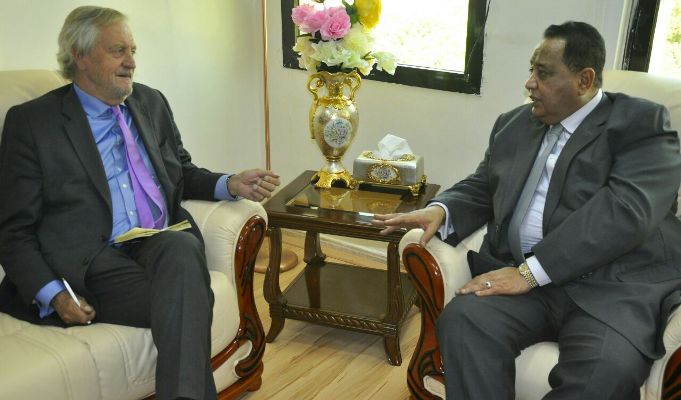Sudan’s FM, UN envoy discuss Sudan’s sanctions and South Sudan’s peace

July 23, 2017 (KHARTOUM) – Sudan’s Foreign Minister Ibrahim Ghanodur and the UN Secretary-General Special Envoy for Sudan and South Sudan, Nicholas Haysom on Sunday have discussed U.S. sanctions on Sudan besides South Sudan’s peace process.
The official news agency SUNA Sunday said Ghandour has briefed the UN envoy on recent developments in relations between Sudan and the U.S. following Washington’s decision to delay the permanent lifting of economic sanctions.
Last January, former U.S. President Barack Obama issued an executive order easing the 19-year Sudan sanctions on a probationary basis. The sanctions relief was to become permanent on 12 July unless the U.S. Administration acted to stop it.
President Donald Trump, in a new executive order issued on 11 July, moved that deadline back by three months, while keeping the temporary sanctions relief in place, citing the need to take more time to assess the robust process.
In response to Trump’s decision, Sudanese President Omer al-Bashir on 13 July decided to suspend the participation of his government in the joint committee until the 12 October, the date of the upcoming decision.
However, following a visit to Riyadh on Tuesday 18 July where he met with the Saudi King Salman and the Crown Prince Mohamed Ibn Salman, the Sudanese president -in a joint communiqué- agreed to a Saudi request to continue the joint meetings with the U.S. official agencies for the permanent lift of economic embargo.
According to SUNA, Ghandour and Haysom also discussed ways to achieve peace, security and stability in South Sudan, pointing to efforts of the East African regional bloc IGAD, the Troika countries and the donor countries.
South Sudan seceded from Sudan on July 9th, 2011 following a referendum on whether the semi-autonomous region should remain a part of the country or become independent. 99% of the southern voters chose independence.
However, the world’s newest nation plunged into civil war in December 2013 due to a power struggle between President Kiir and the country’s former First Vice President Machar. As a result, tens of thousands of people have died and nearly two million displaced.
In August 2015, the warring parties signed a peace agreement in Addis Ababa under the auspices of IGAD but the deadly clashes have resumed in the capital, Juba in July 2016.
The conflict has since spread to Equatoria and Bahr El Ghazal regions, which were initially considered peaceful during the earlier periods when violence broke out in 2013.
UNAMID REDUCTION
Meanwhile, Ghandour has discussed with the United Nations Under-Secretary-General for Peacekeeping Operations, Jean-Pierre Lacroix ongoing arrangements for downsizing the hybrid peacekeeping mission in Darfur (UNAMID).
In a statement extended to Sudan Tribune Sunday, Foreign Ministry spokesperson Gharib Allah Khidir said the meeting stressed the need to intensify meetings among the UN, the Sudanese government and the African Union to implement gradual and smooth exit of the UNAMID.
On 29 June, the UN Security Council decided to extend the mandate of the Mission until 30 June 2018. It further decided that UNAMID’s troop and police ceiling shall be reduced to 8,735 military personnel and 2,500 police personnel.
However, it provided to maintain peacekeepers in Jebel Marra to protect civilians due to the refusal of rebel group to join the peace process or to commit itself to a unilateral cessation of hostilities and the possible clashes with the army that may affect civilians.
According to Khidir, the meeting also discussed coordination between Sudan and the UN in order to empower the UN Interim Security Force for Abyei (UNISFA) to carry out its duty and to complete the Joint Monitoring and Verification Committees.
(ST
